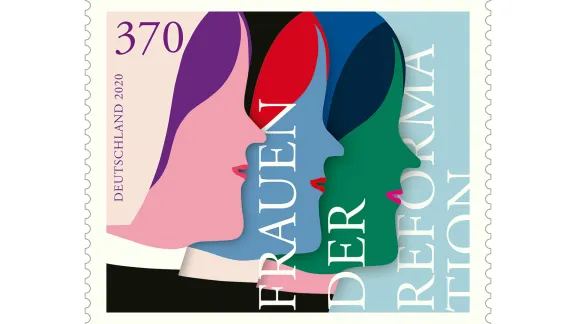
The âWomen of the Reformationâ commemorative stamp was designed by Susann Stefanizen and presented to the public in the Market Church in Hannover, Germany. Photo: Federal Ministry of Finance
Illustrating the contribution of courageous women
(LWI) – Alongside men such as Martin Luther and Philipp Melanchthon, many women had a hand in bringing about the Reformation 500 years ago. This was shown with a commemorative stamp in their honor, which is available at the German postal service since the beginning of October. It pictures three stylized women's heads in different colors with the legend "Frauen der Reformation" (Women of the Reformation). The stamp has a nominal value of 3.70 Euro – the postage for a large international letter in Germany.
A "far-reaching new development in the church" such as the Reformation was only possible "because many were involved in the making of it – including women," explained Dr. Eske Wollrad, director of the Protestant Centre on Women and Men when the stamp was introduced. Reformation means "that the gospel has found a new path to people." In the early days of the Reformation, this occurred in houses and the streets, i.e., in public – and women were involved, she elaborated. Discussions were no longer taking place among academia and clergy only.
The Reformation was only possible because many were involved in the making of it – including women.
Powerful noblewomen like Elisabeth von Calenberg-Göttingen or Elisabeth von Rochlitz had a crucial impact on the Reformation, said Wollrad. They had the political power to introduce the Reformation in their territories.
In an interview introducing the stamp in journal “postfrisch” Rev. Dr. Margot Käßmann, ambassador of the Council for the Evangelical Church in Germany (EKD) for the 2017 Reformation commemoration, highlighted a few of these women of the Reformation.
She said one of those who engaged in the public theological discussion was Argula von Grumbach. A Franconian baroness, she was one of the best-known authors of pamphlets in the Reformation period and renowned far beyond Franconia's borders. Argula von Grumbach, Käßmann said, had discussions with Luther when he stayed in Coburg Castle during the Imperial Diet of Augsburg in 1530. Grumbach also protested to the Ingolstadt university president when he wanted to ban Reformation literature, and she wrote leaflets. "What a courageous woman!" Käßmann said.
"The women of the Reformation were driven by the fundamental insight that forgiveness and justification take place actually and in reality, through God's Word," said Wollrad. "Yet God's Word is not bound to a mediating authority in the person of a priest but is revealed through personal study of the Bible. For this reason, the Reformation was also an educational movement for women, motivating them to engage with theological issues."


